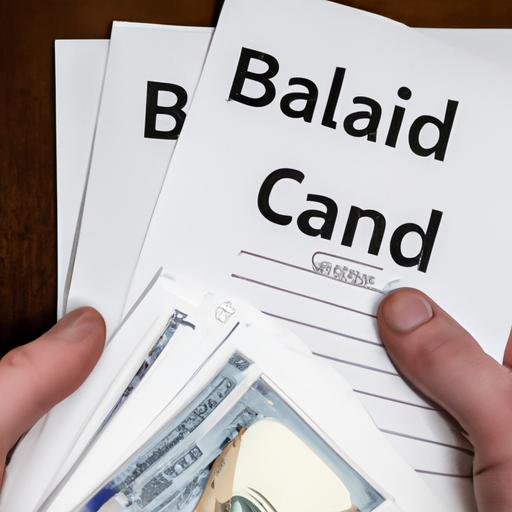Are you drowning in credit card debt, struggling to keep up with multiple payments and high interest rates? debt credit card consolidation might just be the lifeline you need to regain control of your finances. In this article, I’ll explain what debt credit card consolidation is, why it is crucial for individuals, and how it can help you pave the way to a debt-free future.
What is Debt Credit Card Consolidation?
Debt credit card consolidation is a financial strategy that allows you to combine multiple credit card debts into a single loan or payment plan. Instead of juggling various due dates and interest rates, you streamline your debt into one manageable monthly payment. This consolidation process typically involves obtaining a new loan with favorable terms to pay off your existing debts, leaving you with a single, more affordable payment.
Importance of Debt Credit Card Consolidation for Individuals
Debt credit card consolidation holds immense significance for individuals burdened by credit card debt. It provides a structured approach to tackle overwhelming financial obligations and offers several compelling benefits. Firstly, consolidating your credit card debt simplifies your repayment process, reducing the risk of missing payments and incurring late fees. Additionally, it helps you save money by securing a lower interest rate and potentially eliminating high-interest credit card balances altogether.
Moreover, debt credit card consolidation can positively impact your credit score. By making consistent, on-time payments, you demonstrate financial responsibility, which contributes to improving your creditworthiness over time. A higher credit score opens doors to better borrowing opportunities and favorable interest rates in the future.
In conclusion, debt credit card consolidation is an effective strategy to regain control of your financial well-being. By combining your credit card debts into a single payment plan, you can simplify your repayment process, save money on interest, and pave the way to a brighter financial future. Stay tuned as we delve deeper into understanding debt credit card consolidation and explore various consolidation options in the upcoming sections.
Understanding Debt Credit Card Consolidation
Definition of Debt Credit Card Consolidation
Debt credit card consolidation refers to the process of combining multiple credit card debts into a single loan or payment plan. It involves taking out a new loan, often at a lower interest rate, to pay off existing credit card balances. This consolidation simplifies your repayment process by consolidating all your debts into one monthly payment.
How Does Debt Credit Card Consolidation Work?
When you opt for debt credit card consolidation, you typically have several options to choose from:
-
Balance Transfer Cards: With a balance transfer card, you can transfer your existing credit card balances onto a new card with a low or zero introductory interest rate. This allows you to save money on interest payments during the introductory period, typically ranging from six months to a year.
-
Personal Loans: Another option is to obtain a personal loan from a bank, credit union, or online lender. This loan is used to pay off your credit card debts, leaving you with a single loan payment. Personal loans often have fixed interest rates and predictable monthly payments.
-
Home Equity Loans: If you own a home, you may consider a home equity loan. This type of loan uses the equity in your property as collateral. By leveraging your home’s value, you can secure a loan with a potentially lower interest rate. However, it’s essential to consider the risks involved, as your home is at stake if you fail to repay the loan.
-
Debt Management Programs: Debt management programs are offered by credit counseling agencies. These programs involve working with a counselor who negotiates with your creditors on your behalf to lower interest rates and create a structured repayment plan. You make a single monthly payment to the agency, and they distribute the funds to your creditors.
Benefits of Consolidating Credit Card Debt
Consolidating your credit card debt offers numerous benefits, including:
-
Simplicity: By consolidating your debts into one monthly payment, you eliminate the need to keep track of multiple due dates and amounts, making it easier to stay organized and avoid missed payments.
-
Lower Interest Rates: One of the primary advantages of debt credit card consolidation is the potential to secure a lower interest rate. This can reduce the amount of money you pay in interest over time, helping you save money and pay off your debt more efficiently.
-
Faster Debt Repayment: With a lower interest rate and a single payment to manage, you can allocate more funds towards paying down your principal debt. This can accelerate your debt repayment journey and help you become debt-free sooner.
In the next section, we will discuss different debt credit card consolidation options in more detail, exploring their pros and cons to help you make an informed decision.
Exploring Different Debt Credit Card Consolidation Options
When it comes to debt credit card consolidation, you have several options to choose from. Each option has its own advantages and considerations. Let’s explore some popular consolidation methods:
1. Balance Transfer Cards
Balance transfer cards allow you to transfer your existing credit card balances onto a new credit card with a low or zero percent introductory interest rate. This option can be appealing if you have good credit and can pay off your debt within the promotional period. However, it’s essential to carefully read the terms and conditions, as high interest rates may apply after the introductory period ends.
2. Personal Loans
Personal loans are a common choice for debt credit card consolidation. These loans are typically unsecured and can be used to pay off your credit card debts. By consolidating your debts into a personal loan, you can often secure a lower interest rate and have a fixed repayment term. It’s crucial to compare interest rates and fees from different lenders to find the most favorable terms.
3. Home Equity Loans
If you own a home, a home equity loan can be a viable option for debt consolidation. With a home equity loan, you borrow against the equity in your property and use the funds to pay off your credit card debts. This option often offers lower interest rates, but it puts your home at risk if you’re unable to make the loan payments. It’s important to assess your financial situation and consider the potential consequences before choosing this option.
4. Debt Management Programs
Debt management programs involve working with a credit counseling agency to create a repayment plan for your credit card debts. These programs negotiate with your creditors to lower interest rates and consolidate your debts into a single monthly payment. While this option can provide structure and professional guidance, it’s essential to choose a reputable agency and understand any fees involved.
As you explore these different debt credit card consolidation options, consider your financial goals, credit score, and personal circumstances. It’s advisable to consult with a financial advisor or credit counselor to determine the best approach for your specific situation. Stay tuned as we dive deeper into the factors to consider before opting for debt credit card consolidation in the next section.
Factors to Consider Before Opting for Debt Credit Card Consolidation
When considering debt credit card consolidation as a solution for your financial struggles, it’s crucial to evaluate various factors to ensure it’s the right choice for you. Let’s explore some key considerations before diving into consolidation:
Assessing Your Financial Situation
Before embarking on a debt credit card consolidation journey, take a comprehensive look at your financial situation. Calculate your total debt, including credit card balances, interest rates, and minimum monthly payments. Understanding your current financial standing will help you determine if consolidation is a viable option and if it will truly alleviate your debt burden.
Interest Rates and Fees
One of the primary advantages of debt credit card consolidation is the potential to secure a lower interest rate. Research and compare the interest rates and fees associated with different consolidation options. Consider whether the proposed rates and fees will result in substantial savings over time. A lower interest rate can significantly reduce the total cost of your debt and accelerate your path to financial freedom.
Credit Score Implications
Consolidating your credit card debt can have both positive and negative implications for your credit score. On one hand, successfully managing your consolidation plan and making timely payments can improve your credit score over time. On the other hand, applying for a consolidation loan might result in a temporary dip in your credit score. It’s important to weigh the potential impact on your credit and consider the long-term benefits of consolidation.
Potential Risks and Drawbacks
While debt credit card consolidation offers numerous advantages, it’s essential to be aware of potential risks and drawbacks. Consolidating your debts may tempt you to accumulate new debt, especially if your credit card balances are paid off. Additionally, if you opt for a secured loan, such as a home equity loan, you put your assets at risk if you’re unable to make payments. Carefully evaluate these risks and weigh them against the potential benefits before committing to consolidation.
By considering these factors, you can make an informed decision about whether debt credit card consolidation aligns with your financial goals and circumstances. Stay tuned as we move forward to explore the various options available for consolidating credit card debt.
Steps to Take for Debt Credit Card Consolidation
Evaluate Your Current Debt Situation
The first step in embarking on your debt credit card consolidation journey is to evaluate your current debt situation. Take stock of all your outstanding credit card balances, interest rates, and minimum monthly payments. This assessment will provide you with a clear understanding of the magnitude of your debt and help you determine the most suitable consolidation option.
Research and Compare Consolidation Options
Once you have a comprehensive view of your debt, it’s time to research and compare different debt credit card consolidation options. Consider factors such as interest rates, fees, repayment terms, and eligibility criteria for each option. Common consolidation methods include balance transfer cards, personal loans, home equity loans, and debt management programs. Analyze the pros and cons of each option to make an informed decision that aligns with your financial goals and circumstances.
Create a Debt Repayment Plan
With your consolidation method chosen, it’s essential to create a debt repayment plan. Set realistic goals and milestones to keep yourself motivated throughout the process. Determine how much you can afford to pay each month and allocate it towards your consolidated debt. Prioritize high-interest debts to save on interest costs and accelerate your journey towards becoming debt-free.
Apply for the Chosen Consolidation Method
Once your plan is in place, it’s time to take action and apply for the chosen consolidation method. Gather all necessary documents and submit your application. Be prepared for a thorough evaluation of your financial situation, credit history, and income. If approved, you’ll receive the funds or the new credit card to pay off your existing credit card balances.
Track Progress and Make Necessary Adjustments
Consolidating your credit card debt is not the end of the journey; it’s the beginning of your path to financial freedom. Regularly track your progress and make necessary adjustments to your repayment plan. Stay disciplined and committed to your goals, and if unforeseen circumstances arise, don’t hesitate to seek professional advice or make adjustments to your plan accordingly.
By following these steps, you can navigate the process of debt credit card consolidation with confidence and set yourself up for a successful debt repayment journey. Remember, patience and perseverance are key, and with each payment, you’ll be one step closer to achieving your financial goals.
Tips for Successful Debt Credit Card Consolidation
Embarking on a journey towards successful debt credit card consolidation requires careful planning and commitment. To ensure a smooth and effective consolidation process, consider implementing these tips:
1. Develop a Budget and Stick to It
Creating a realistic budget is crucial for effective debt management. Take a close look at your income and expenses, and allocate a specific amount towards debt repayment each month. By sticking to this budget, you can prioritize your debt obligations and avoid overspending.
2. Cut Unnecessary Expenses
Identify areas where you can cut back on expenses to free up more funds for debt repayment. This may involve making temporary sacrifices, such as reducing dining out or entertainment expenses. By tightening your spending habits, you can accelerate your progress towards becoming debt-free.
3. Avoid Accumulating New Debt
One of the most important aspects of debt credit card consolidation is to break the cycle of accumulating new debts. Resist the temptation to use your credit cards for unnecessary purchases. Instead, focus on paying off your consolidated debt and building healthier financial habits.
4. Seek Professional Advice if Needed
If you find yourself overwhelmed or unsure about the best course of action, don’t hesitate to seek professional advice. Financial counselors or debt consolidation experts can provide guidance tailored to your specific situation, helping you make informed decisions and navigate the complexities of debt consolidation.
5. Stay Committed to the Repayment Plan
Consolidating your credit card debt is just the first step. It’s crucial to stay committed to your repayment plan and make consistent, on-time payments. This dedication will not only help you eliminate your debt but also rebuild your financial stability and creditworthiness.
In conclusion, successful debt credit card consolidation requires discipline, careful planning, and a steadfast commitment to your financial goals. By developing a budget, cutting unnecessary expenses, avoiding new debt, seeking professional advice when needed, and staying committed to your repayment plan, you can pave the way to a debt-free future. Remember, the road to financial freedom may have its challenges, but with determination and the right strategies in place, you can achieve it.





